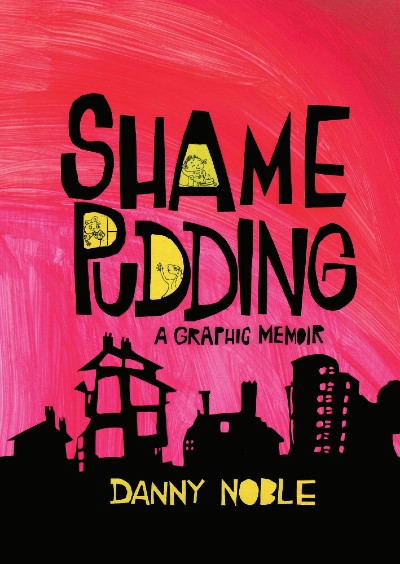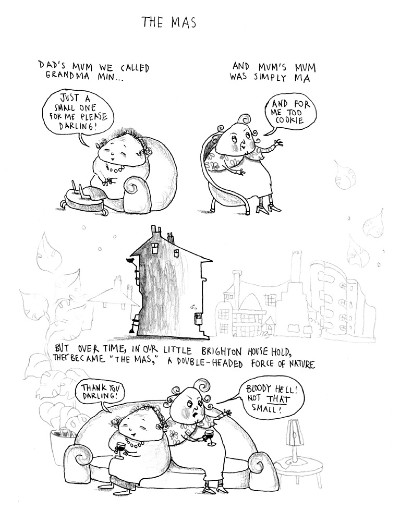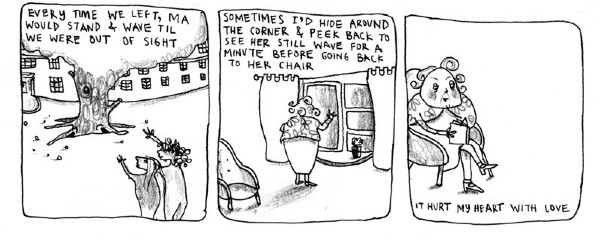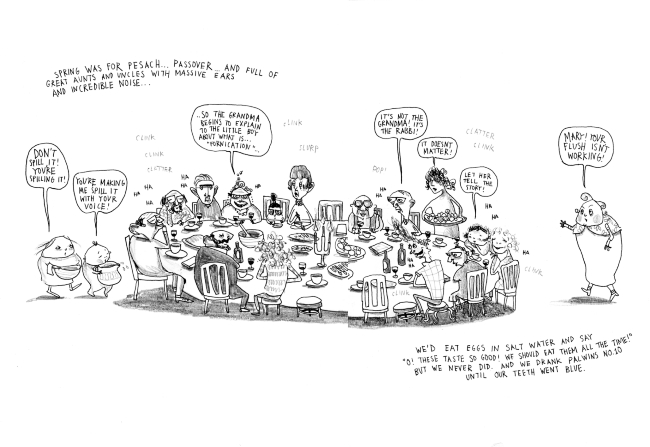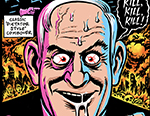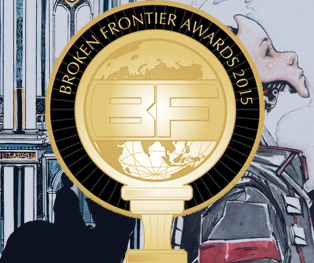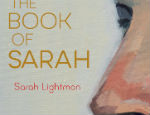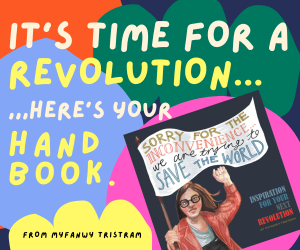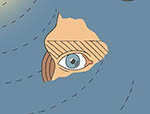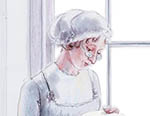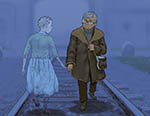In graphic memoir Shame Pudding, artist Danny Noble takes a markedly different approach to autobiographical comics work than her past practice in this area. Noble, one of Broken Frontier’s first intake of ‘Six Small Press Creators to Watch’ back in 2015, previously brought her world to life on the comics page through thinly veiled stand-in protagonists (Hangover Farm), unlikely avatars (Was It… Too Much for You?), or in brief newspaper-style strips (Monday Morning).
Noble’s ability to amuse with comic timing that borders on perfection, or to tinker with the boundaries of the form to playfully subvert its structure, are undoubted to anyone familiar with her comics back catalogue. Indeed back in 2015 I said that I had never seen an artist with a more naturally instinctive command of the unique storytelling possibilities of the comic page. But one thing was always missing in her comics portfolio – a longer-form offering that would take her eccentric but visually eloquent style to the next level of deserved appreciation.
Published by new venture Street Noise Books, Shame Pudding finally gives Noble that opportunity. The title is a corruption of a Yiddish term, used by Noble’s grandmother as a term of endearment, and Shame Pudding a testament to the impact of both her Jewish grandmothers (“Ma” and “Grandma Min”, or more simply here the pluralised The Mas) on her life, weaving their stories in and and out of her account of her own formative years.
Fittingly in a book that compiles individual memories into a greater whole, Shame Pudding is largely an exercise in anecdotal vignettes that are tied together not by a rigid narrative structure but by remembrances of the bonds of family. Beginning with a scene-setting gathering of the extended Noble clan, we’re introduced from a child’s eye view of the world to a wide cast of players that immediately speaks of the forces that shape us and of the unspoken comfort of family.
Presented in episodic chapters Noble tells us of her very different, yet equally close, relationships with those two formidable but enchanting grandparents, from early childhood to adulthood. In one key early sequence the young Danny’s explorations of her world lead to an unlikely existential crisis. It’s one that will be echoed in later life when her confidence becomes battered by feelings of shame and guilt that manifest as a tangible entity; one that torments and taunts her. But, throughout, the background constant of that grandmaternal love becomes a grounding point for her, as she moves from teenage political rebelliousness to art school, and beyond to the world of employment and her musical passions.
What Noble so touchingly portrays here with a cheeky, affectionate wit are the idiosyncrasies, the customs, the rituals, and the shared jokes of family life that will resonate with every reader. They’re at once incredibly personal and specific, and yet simultaneously also familiar and even universal. For all the fun of the carefully observed and lovingly flippant humour on show here, though, it’s the quieter moments that ironically speak loudest.
Noble’s comic timing has always been exquisite in its delivery but here her pacing is used as much to depict the resonant and the evocative. In one scene, that perhaps best captures Shame Pudding in just three panels (above), she sneaks back after a visit to Ma’s to observe her still waving goodbye from the window of her flat a full minute after Noble had ostensibly disappeared from view. “It hurt my heart with love” she says with the same understated yet overwhelmingly powerful use of language that is scattered throughout the pages of the book.
As ever Noble’s scratchy, inky layouts and charmingly distorted caricature is delightful in its distinctive delivery. But it’s that fluency in the language of comics that makes this such a connective and immersive experience. Depicted environment and page structure become inextricably entwined, while lettering and speech balloons become a tangible part of events, snaking around characters and reappearing with an animated life of their own. They impose themselves on events, not simply reflecting them but almost influencing them; not merely moving round single images but traversing panels with a sequential autonomy of their own.
Similarly, with a meta flourish, characters lean out of panels or can call across them, interacting with supporting players in separate images. Pages vary from the roughly panelled but traditional to double-page spreads full of detail that seem to embody multiple mini-narratives in themselves (above). When Shame Pudding reaches the passages that you know are inevitable from the outset Noble’s panel-to-panel pacing serves her well, with an affecting depiction of loss and grief that is beautiful in its moving irreverence and raw honesty.
Shame Pudding has been created with a wider audience in mind than much of Noble’s comics output to date. To call anything that Danny Noble commits to the page restrained, even relatively so, seems oddly inappropriate. But what Shame Pudding does as a result is underline the breadth of the storytelling tools that are a part of her creative repertoire. Here she’s more considered, more driven by pathos than by the easy belly laugh; the strikingly profound overshadowing the surreal, the extravagant and the ostentatious.
Poignant, occasionally outrageous, and yet always delicately observed, Shame Pudding is the full-length Danny Noble work that indie comics fans have long awaited.
Danny Noble (W/A) • Street Noise Books, $16.99 (Available from May 19th)
Review by Andy Oliver





